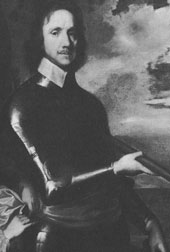OLIVER CROMWELL

OLIVER CROMWELL

from:
Eric R. Delderfield. Kings and Queens of England. N.Y. Stein and Day. 1972.
F.E. Halliday. An Illustrated Cultural History of England. New York: Viking Press, 1967.
Born: 1599.
Died: 1658, aged 59 years. Buried initially Westminster Abbey and after Restoration at Tyburn.
When the troubles between King and Parliament began, Cromwell was an inconspicuous Member of Parliament. His puritanical fervour and passionate oratory quickly led him to a position of eminence in the House of Commons. He had no military experience until his 44th year and at the first battle of the Civil War, was captain of a troop of horse. He later formed his invincible 'Ironsides', his New Model Army, and was a brilliant commander, a fact recognized by Parliament. In I649, after Charles had been brought to his death, Cromwell was given command in Ireland, where Royalist campaigns were still strong; he stormed Drogheda and Wexford, massacring the garrisons with a thoroughness that has left his name for ever notorious in Irish history; he alleged that the slaughter was 'the judgment of God' upon the people. The Puritans' Act of Settlement for Ireland showed total absence of understanding of the country's needs. Scotland, too, which was sheltering and supporting the young Prince Charles, had to be subdued, Cromwell's final victory over the Scottish rebels being as far south as Worcester.
He became Lord General of the Commonwealth and then, in I653, Lord Protector, a position which was a virtual dictatorship, even though in theory the nation was ruled by a Council of State, comprising seven Army leaders and eight civilians. England and Wales were divided into eleven districts with a Major-General over each. Later Cromwell was offered the title of King, but the Republican section of the Army so resisted the suggestion that he declined.
Cromwell began a new foreign policy, rough but effective, designed to give England a share in the Baltic trade and to safeguard her naval supplies rather than to forward any idea of leading Protestant Europe. At home, Parliament was proving unable to cope with the country's chaotic condition. Its outlook was narrowly Puritan--far narrower than that of Cromwell himself in some ways; for instance severe penalties were laid down for Sunday traveling or for profanity. The mass of the Army, on whose support Parliament had relied, disliked such measures; Cromwell was caught between the two, receiving much of the blame for the joyless, unsettled state of the country. A reaction set in against rule by the sword.
At his death he was buried with great pomp in Westminster Abbey, but at the Restoration his body was gibbeted at Tyburn and afterwards buried there.
His son, Richard Cromwell, succeeded to his position, but was not a strong enough character to settle such a divided nation. Army and Parliament were unable to agree on a government, and the Restoration in I660 was more or less a transaction between Royalists and Puritans against the Army--intended more as a Restoration of Parliament than of the King himself. Richard Cromwell had to go to France, but returned, and lived peaceably through four reigns, dying in I7 I2 at the age of eighty-six.